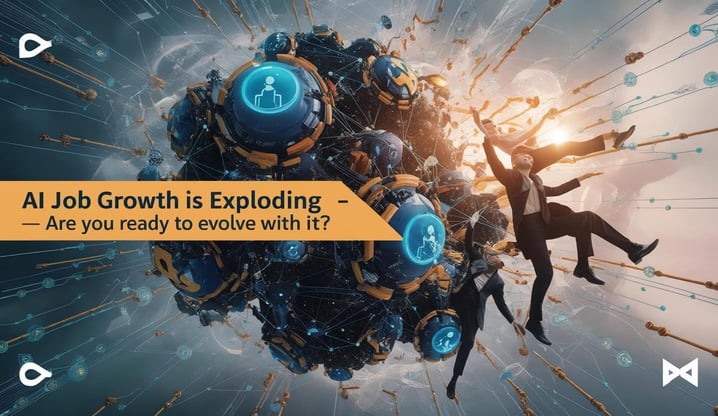🧠 AI Job Growth Is Exploding — Are You Ready to Evolve with It?
AI job growth surges in 2025! Learn which industries are hiring fastest, must-have technical & soft skills, and how to future-proof your career in the AI revolution
Vee Smith
5/12/20253 min read


Picture this: You're sipping coffee, booting up your laptop, and your AI assistant has already drafted your emails, flagged critical client updates, and optimized your work calendar... before you even log in.
Sound sci-fi? It’s already happening. Welcome to the future of work, where AI job growth is more than just a buzzword — it’s a career revolution.
But here’s the kicker: while some jobs are vanishing, many more are emerging. So let’s cut through the headlines, shall we? This isn’t about robots stealing your job. It’s about you evolving with them.
1. How is AI creating new job opportunities?
Contrary to doom-scrolling TikTok takes, AI isn’t here just to replace. It’s here to amplify.
Let’s take generative AI jobs. From prompt engineers to AI ethicists and AI voice designers, these roles didn’t exist a few years ago. Now? They’re booming. Why? Because every tool needs a human to guide it.
Story time: I met a UX designer who transitioned into an “AI Conversation Architect” for a chatbot startup — and she swears it’s the most creatively fulfilling job she’s had. All she needed? A short remote AI training program and a ton of curiosity.
2. Which industries are experiencing the fastest AI job growth?
Let’s break it down. These industries are not just flirting with AI —they’re in a full-blown relationship:
Now add to that AI job growth in emerging markets. Countries like India, Nigeria, and Brazil are ramping up tech education, launching local startups, and hiring AI freelancers like never before.
3. What skills are most in demand for AI-related roles?
Spoiler: You don’t need a PhD in machine learning to thrive in the AI world.
Here’s what’s hot in 2025:
Technical skills:
Python & R (machine learning, automation)
Data engineering
Natural language processing (NLP)
AI ethics & governance
Model Ops (MLOps)
Soft + transferable skills:
Critical thinking (not everything can be auto-piloted)
Prompt design (how you talk to AI matters)
Human-AI collaboration
Creative problem solving
And yes, there’s a talent shortage in AI. Upskilling with AI certifications for non-tech professionals is a smart, low-risk way to pivot careers. Think of it as your golden ticket to relevance.
4. Will AI lead to job displacement, and how can workers adapt?
Short answer: Yes. But wait — not the whole story.
Yes, AI will automate repetitive jobs: data entry, basic accounting, and even some customer service roles. But it also creates more meaningful, human-centric roles that require decision-making, creativity, and emotional intelligence.
This is where hybrid AI-human collaboration roles come in — think of them as dynamic duos. The AI handles the grunt work. You bring the heart and strategy.
Don’t compete with AI. Collaborate with it.
So how do you adapt? Here’s your checklist:
Start learning AI tools today (even if it's just ChatGPT or Midjourney)
Enroll in remote AI training programs (Coursera, Udemy, and even LinkedIn are stacked)
Follow AI job boards to stay ahead of market trends
Get certified — especially if you’re from a non-tech background
5. What are the highest-paying AI jobs in 2025?
Money talks — and in AI, it screams. According to the latest AI job growth statistics for 2025, here’s where the real bucks are:
Pro tip: Many of these roles are remote-friendly. So yes, you can chase dollars in your sweatpants from Bali.
6. AI skills demand: the real MVP of career insurance
Let’s get real — if you’re still treating AI like a “tech-only” thing, you’re playing career roulette.
Whether you’re in marketing, HR, law, or even fashion, you’re going to need AI awareness. It’s no longer a niche — it’s a native skill. Like Excel in the 2000s.
And guess what? Employers are watching. Companies with ethical AI hiring practices are actively looking for diverse candidates who understand AI from all angles — not just code but impact, bias, and responsibility.
Conclusion: Your career, rebooted
So… where do we land?
AI isn’t just disrupting the job market. It’s reinventing it. The future of AI jobs is flexible, global, creative, and — believe it or not — very human.
This isn’t about becoming a robot. It’s about learning how to work with one.
And trust me — if I can go from skeptical observer to writing entire articles with an AI co-pilot, you can ride this wave, too.
Let’s talk:
Have you seen AI change your job yet? Are you learning new skills, or still figuring out where to start? Drop your thoughts in the comments. Let’s compare notes, swap insights, and maybe even spark the next big freelance AI hustle together.
AI ZENTRO
Stay updated with the latest AI innovations today.
AI ZENTRO © 2025. All rights reserved.
